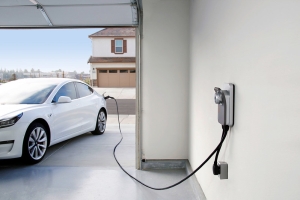Clean Energy Canada | Countering common myths about electric vehicles
October 8, 2024

Visit our new calculator to find out how much you can save.
Myth: EVs have greater lifecycle emissions than gas cars
Fact: Gas cars emit up to three times more pollution than EVs
- Globally, electric vehicles have been shown repeatedly to have lower lifecycle emissions than traditional gas-powered vehicles, even in regions with fossil-fuel-dependent electricity grids.
- Specifically, studies have shown that EVs emit as much as 71% less carbon pollution than gas cars—that includes pollution from mining, manufacturing, and driving. What’s more, as mining and manufacturing are electrified, life cycle emissions from EVs will drop even further.
- EVs are especially clean when battery recycling is included (up to 95% of the material from an EV battery can be recycled).
Myth: EVs are more expensive than gas cars
Fact: EVs are easily cheaper over their lifetime, and sometimes cheaper upfront
- Today’s EV drivers pay the equivalent of $ per litre gas to charge their cars—less than what drivers paid for gas during the gas wars of the ’90s.
- When considering the full cost of ownership over the course of a decade, from a car’s purchase price to fuel and maintenance, a typical EV saves drivers roughly $30,000 or about $3,000 a year.
- Specifically, choosing an electric hatchback or SUV instead of a gas version will save you $28,500 over a 10-year ownership period. The same is true for sedans and trucks. Opting for a Tesla Model 3 instead of a Lexus ES will save you $38,000, while electric truck drivers will save a huge $40,000 over 10 years by choosing an electric F-150 instead of a gas-powered one.
Myth: EV batteries need replacing before the vehicle’s end of life
Fact: EV batteries have been shown to last for more than 20 years of driving
- All EVs sold today include a battery warranty of at least eight years and 160,000 kilometres.
- A recent study found that EV batteries degrade just 1.8% per year on average—meaning EV batteries can typically last more than 20 years.
- Another analysis found that EVs from 2016 and newer have less than a 1% battery replacement rate, and nearly all of these instances happen under warranty (except in rare cases of accident or damage).
- Tesla has claimed that the range on its Model S and X vehicles decreased by just 12% after 321,000 kilometers of driving (these models are older and therefore offer insights based on real-world data).
Myth: EVs do not have enough range
Fact: The average Canadian drives 60 kilometers per day—far less than the average EV range of 480 kilometres
- The average range of new EVs is now almost 480 kilometres—and rising. Most Canadians drive less than 60 kilometres per day, while the average EV driver does between 80% to 90% of charging at home, usually just plugging in overnight for convenience. What’s more, these driving requirements mean that Level 1 charging using a regular power outlet is likely adequate for most EV-owning households.
- As Canada’s fast-charging network grows, range and charging will become less of a concern for longer trips. There are now fast chargers at 20 out of 23 ONroute rest stops in Ontario, while PetroCanada has already installed chargers along the TransCanada highway from Halifax to Victoria.
- The Government of Canada has committed to deploy 84,500 chargers by 2029 and is on track to meet its 2026 target.
Myth: The electricity grid can’t handle EVs
Fact: With planning, grid-related issues are easily avoidable
- While the switch to EVs will require provinces to plan for EV growth, other countries around the world (EVs account for some 80% of new cars sold in Norway) have not experienced grid-related issues as a result of high EV adoption.
- A Canadian government study on the anticipated electricity needs of EVs found that they would represent 3%, 16%, and 22% of electrical power demand in 2030, 2040, and 2050, respectively. As the study states, “This number is significant, but since the growth is spread over 30 years, with most happening during the 2030 to 2050 timeframe, Canadian utilities have 10 years to refine the load forecast and plan for grid expansion.”
Myth: EVs are not suitable for cold Canadian winters
Fact: EVs are more reliable in cold weather than gas cars
- EVs do lose some range during extreme cold. Some studies have shown range loss to be no more than 30% and as low as 8% for some makes and models. However, other studies of extreme cold have found it to be between 30% and 50%.
- EVs have considerably more range than required for most daily journeys (see myth five).
- What’s more, cold weather can also increase gas car fuel consumption by up to 28%, effectively reducing range and increasing fuel costs.
- In addition, most modern EVs have battery heating options that preheat the battery before driving to reduce range loss.
- Unlike a gas car, EVs do not have problems starting in cold weather, and many EVs allow owners to remotely preheat the passenger compartment before driving.
Myth: EVs have a greater fire risk than gas cars
Fact: Fires are more common in gas cars than EVs
- A 2022 study from insurance website AutoInsuranceEZ tracked car fires in the U.S., finding that electric vehicles saw just 25 fires per 100,000 EVs sold compared to 1,530 fires for every 100,000 gas cars. In other words, fires occurred in one in every 4,000 EVs compared to one in every 65 gas cars.
Visit our new calculator to find out how much you can save.
Share more resources
Download and share this one-page EV myth-buster:
Share our postcards:
Share our video on three things you might not know about EVs: